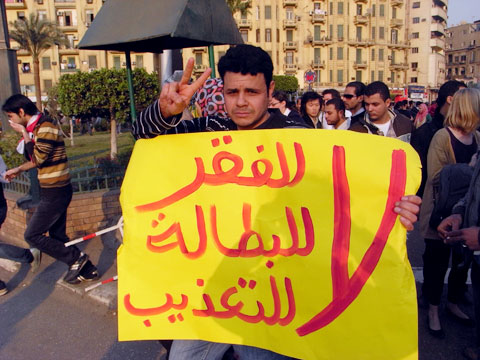Egypt Feature: Does the Solution Lie in the Economy? (Bohn/Lister)
 "No to Poverty, No to Unemployment, No to Torture"Lauren E. Bohn and Tim Lister write for CNN:
"No to Poverty, No to Unemployment, No to Torture"Lauren E. Bohn and Tim Lister write for CNN:
Amid all the furor about the seemingly omnipotent military in Egypt, the disbanded Islamist-dominated parliament and the debate over whether the Muslim Brotherhood will ban beer and bikinis, it's tempting to mutter, "It's the economy, stupid."
In 18 months of upheaval, all Egypt's economic indicators have headed south.
Growth is a projected 1.5% this fiscal year, far too feeble to provide a young and rapidly growing population with jobs (80% of Egypt's population is under age 30). Unemployment, one of the engines of the revolution, is estimated to be as high as 25% among the young. Tourism revenues have fallen sharply, and foreign reserves have dwindled to $15 billion. According to the United Nations, some 40% of Egyptians live below the poverty line; 14 million people subsist on less than $1 a day. Institutions are chronically weak and corruption is endemic.
President-elect Mohamed Morsi has his hands full.
Many critics say the military has handed Morsi a neutered presidency doomed to fail. But economists who have dealt with the Muslim Brotherhood's economic team describe the team as pragmatic, well-prepared and favorable to the free market.
Hernando de Soto, a noted economist who has helped his native Peru empower millions, has consulted with the Muslim Brotherhood. He says that when he met millionaire Khairat el-Shater, the Brotherhood's first presidential candidate who was disqualified for legal matters, el-Shater described himself as "businessman" on his card.
"They want to create a market economy for the poor, to bring them into the mainstream," de Soto says.
The Muslim Brotherhood has pledged to reach a rapid accord with the International Monetary Fund to cool Egypt's borrowing costs and protect the value of its pound. The interim military government raised money by selling bonds to Egyptian investors -- but at rising interest rates, with the yield on the one-year bill reaching a dizzying 16%. The new government will have to repay or roll over some $4 billion in short-term borrowing over the next six months.
There have been several rounds of negotiations between the Finance Ministry and the IMF for a $3.2 billion loan, but they have yet to yield an agreement. That amount may now be inadequate. Masood Ahmed, one of the IMF's senior officials for the Middle East, summed up the challenge last month: "How can we help Egypt now come up with an economic program that would restore confidence, protect poor people and vulnerable households -- and do so in a way that restores confidence during uncertainty?"
Hafez Ghanem, a senior fellow at the Brookings Institution who was recently in Egypt, says the immediate priority is to devise a "bold, credible program to reduce the outflow of reserves, encourage investment and bring in other donors" through an agreement with the IMF.
He advises the new government to focus on two or three priorities. The first is tackling corruption, which resonates with every Egyptian. "Real progress on corruption will have to involve a partnership between the government, the private sector and NGOs," he says.
He looks at the example of Indonesia. After the fall of President Suharto, the new government embarked on decentralization, partnering with nongovernmental organizations and civil society. Results were not immediate, but the perception of change was.
The second priority, Ghanem says, must be the subsidies that consume such a large part of the national budget.
The country's growing deficit could be cut significantly if fuel subsidies were removed. But that's not going to happen. The Brotherhood is anxious to protect the poor Egyptians who propelled it to power, even though 90% of the subsidy benefits the wealthiest 20% of Egyptians.

 Thursday, July 5, 2012 at 6:50
Thursday, July 5, 2012 at 6:50
Reader Comments